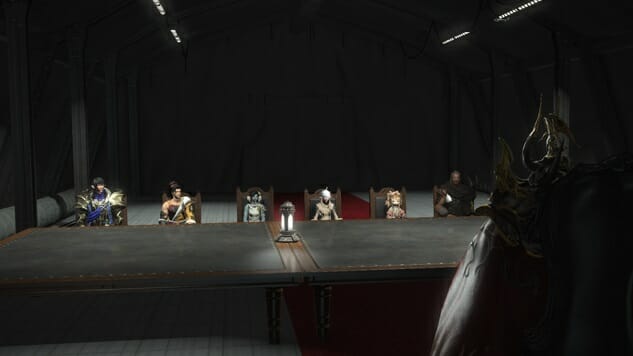Final Fantasy XIV Doesn’t Run From Its Politics Like So Many Other Games
Games Features Final Fantasy XIV
Nothing is apolitical. That politics influence everything in this world is a simple truth, yet it’s something I keep seeing game development companies and figures deny, and I’m tired. It’s one of the reasons why catching up on Final Fantasy XIV, which wholeheartedly embraces its politics and incorporates rich nuances in its discussions about oppression, has been so refreshing. In particular, its unabashed takedown of fascism and its exploration of the impacts of oppression make for some of the most fascinating writing I’ve seen.
The world of XIV is incredibly complex, rife with politics, human crisis and conflict, much of which stems from the Garlean Empire, which has seized control of the majority of Eorzea through advanced technological warfare. Their goal is to eliminate eikons (primals/summons), and to do this they believe all of Eorzea should be united under one Garlean banner. As their emperor states, they “come not to conquer, but to liberate—to free man from the prison of divergence. Imagine a world united. One perfect race beneath a single standard.”
Though it’s always sought increased power, the empire stepped back after colonizing Ala Mhigo around two decades prior to the start of XIV. The violent invasion displaced Ala Mighans and forced them to flee in droves to Ul’dah, which is deeply capitalist and has coin but little empathy to spare, and Gridania, which isn’t welcoming of outsiders. Largely shunned by both, refugees must struggle to survive, live in a small refugee settlement outside of these city states known as Little Ala Mhigo or return to their occupied homeland. The Garlean Empire’s oppression of Ala Mighans is one of the game’s major plot points and the focus of its second expansion, Stormblood.

XIV isn’t afraid to display the full impact of oppression: the lack of resources available to a dying people forced to exist on the margins of society; the daily psychological terror of living under a fascist regime; the delicacies and dangers of powerful, well-meaning outside allies intervening in the affairs of marginalized (and largely brown or otherwise of color) people. It also accompanies these things with important, compelling questions—not questions like “is oppression bad,” but rather ones like: what do oppressors look like? What happens when the oppressors look like the marginalized? How accountable are they as individuals versus the dominant system? What does a revolution look like for different people, and is it easily accessible for everyone?
The arsenal of the Garlean Empire is made up of not just military weaponry but also psychological indoctrination. By conscripting soldiers from the places they’ve invaded, they expand further and promote Garlemald as an ideology. The colonized forced into service are promised citizenship, respect and stability to perpetuate their own cycles of oppression. They employ Garlean rhetoric against other Ala Mighans, calling them “savages” and drawing a line between citizens and non-citizens, between those who have rights and those who aren’t seen as people. But these people can only strive to be an in-between class, for they’re rewarded with their oppressors eagerly reminding them of their inferiority as Ala Mighans when it’s convenient.
From the beginning and until my time right before Shadowbringers, XIV never does anything but unequivocally paint the empire as what it is: a fascist regime with no redeeming qualities. Villains are given backstories and their reasons for being how they are get established, but there’s no attempt to justify their acts of oppression. There’s no attempt to take “great pains” to make them likable or sensible; there’s no fear behind indeed pointing to people who subscribe to Garlean ideology and going, “look how horrible this is.” Garlemald is believable because governments and people like it exist in the real world and disenfranchise people on a daily basis.

I’d need a much longer article to delve into all the nuances regarding oppression, bigotry, racism and fascism, but these are topics that XIV establishes from the beginning, carries through Heavensward, centers in Stormblood and will surely discuss in Shadowbringers. That a major, big budget videogame understands the importance of not even slightly downplaying the horrors of micro and macro aggressions, examines and criticizes what they’re born from and grow to become, and demands that entire systems built on this bullshit should be eradicated, is relieving to see.
And it does this while committing to the idea of a better future, of a revolution that leads to the liberation that people deserve. In the Garlean Empire, it explicitly sets up a villainous entity that strives for domination and for the creation of a singular “perfect” race. In the heroes of XIV, it combats this notion with the belief that diversity is what makes a nation great; that all the diverse people in the world deserve to know freedom—and to simply be. I’m glad to see XIV embrace the fact that everything is in some way political, and that to turn a blind eye to this and how politics are used to subjugate human beings is a disservice to ourselves and each other.
Natalie Flores is a freelance writer who loves to talk about games, K-pop and too many other things at @heartimecia.